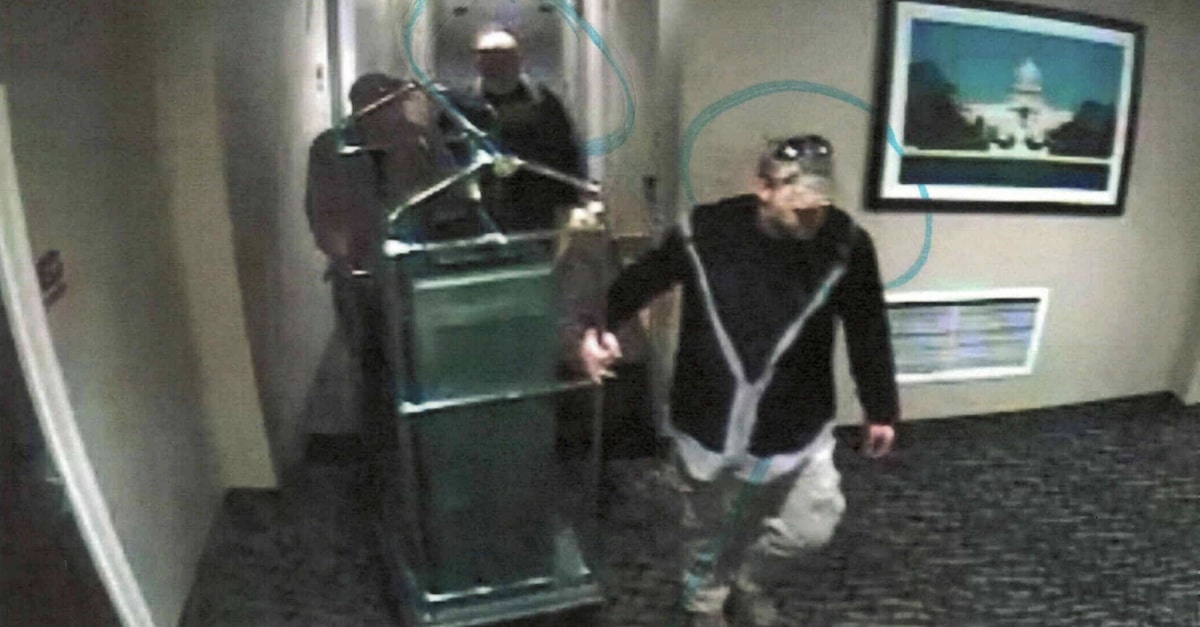
Oath Keepers members Thomas Caldwell and Kenneth Harrelson move a cart of what prosecutors allege to be weapons inside a Comfort Inn in Virginia, for their so-called “Quick Reaction Force.” Prosecutors allege that they planned to ferry those firearms across the Potomac if then-President Trump called them. (Photo via DOJ)
Through multiple days on the witness stand, an FBI agent delivered detailed testimony about the Oath Keepers’ so-called “quick reaction force,” an offshoot within the extremist group that prosecutors say stood ready to deliver weapons to Washington, D.C., at former President Donald Trump’s command.
On Monday, attorneys for multiple Oath Keepers played down the quick reaction force, or QRF, as the group’s “standard operating procedure” whenever they attended protests across the country.
Throughout her testimony, FBI agent Sylvia Hilgeman authenticated cell phone towers records, closed circuit TV surveillance footage, bank records, text messages, and other exhibits backing the government’s case. The cell phone records showed the group traveling from around the country and converging at a Comfort Inn in Virginia, just outside of Washington, D.C. Inside the hotel, the CCTV video showed members of the QRF entering the hotel, walking through the hallways and pushing unidentified parcels on dolly carts. The bank records showed Rhodes buying thousands of dollars worth of guns and components.
After days of this presentation, defense attorneys for the five Oath Keepers leaders and members standing trial in its first phase took turns trying to undermine the revelations.
Rhodes’ lawyer James Lee Bright’s questioning frequently turned contentious, as he made the case that the so-called QRF was “standard operating procedure” for the Oath Keepers.
Bright said that the group had a QRF waiting in Louisville at a protest over the deadly raid that killed Breonna Taylor. There was another QRF in a van in northern Virginia for the Million MAGA March, the attorney said.
Throughout his cross-examination, Bright also grilled Hilgeman about her knowledge of firearms and gun laws. Rhodes allegedly made some of those purchases on a site called GunBroker, using his own account in a hand-to-hand transaction. Bright said that his client, a Yale-educated lawyer, took part in these transactions openly because they were not illegal.
Bright also tried to distance Rhodes from the Comfort Inn, where the Oath Keepers QRF were said to have gathered.
“Of the rooms in the Comfort Inn, how many were in Mr. Rhodes’s name?” Bright asked.
“None,” Hilgeman acknowledged.
Rhodes himself did not appear in any of the CCTV footage presented by the FBI agent.
Bright also emphasized that the QRF never activated. Despite alleged plans to ferry the weapons by boat across the Potomac, no vessel was ever docked for the Oath Keepers. The Oath Keepers defendants so far have not disputed that they stood ready to activate the QRF at Trump’s command, but the former president never called them.
“The ‘armed’ rebellion wasn’t armed,” Bright asserted.
“The armed rebellion wasn’t over,” Hilgeman responded, noting that the alleged conspiracy extended weeks before Jan. 6, 2021 — and after it.
The extremist group has claimed that they believed that they could have lawfully served as Trump’s paramilitary force if he invoked the Insurrection Act.
The jury also heard briefly from reporter Micah Loewinger, a correspondent on New York public radio station WNYC’s show “On the Media.” Loewinger recorded the Oath Keepers’ communications on Zello for a report on how militia groups used the walkie-talkie app to organize the Jan. 6 attack on the Capitol. He played some of those recordings on the show’s podcast, under the title “How Zello Became a Recruitment and Organizing Tool for the Far-Right.”
Explaining why he required a government subpoena to draw him to the witness stand, Loewinger said: “I believe strongly in journalistic independence and integrity.”
Earlier in the day, jurors were shown sexually charged text messages between Rhodes and lawyer Kelly SoRelle, who faces an indictment herself.